Soft Law and Hard Law in International Law
VerifiedAdded on 2023/06/15
|11
|3677
|240
AI Summary
This article discusses the meaning and nature of soft law and hard law, differences between them, their context in international sphere and why soft law is preferred and favoured. It also covers Ellie's argument on Soft law and its distinction from Binding International law.
Contribute Materials
Your contribution can guide someone’s learning journey. Share your
documents today.
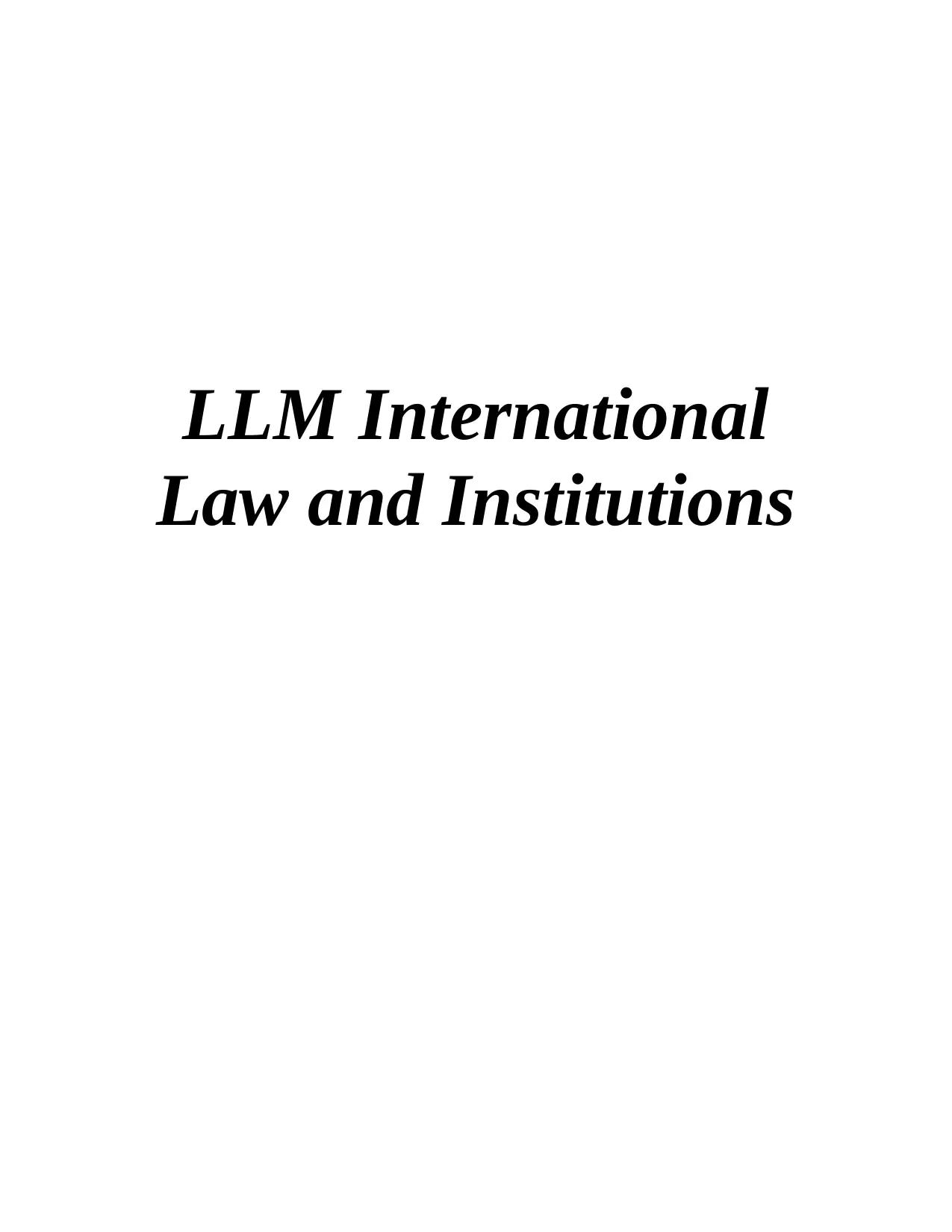
LLM International
Law and Institutions
Law and Institutions
Secure Best Marks with AI Grader
Need help grading? Try our AI Grader for instant feedback on your assignments.
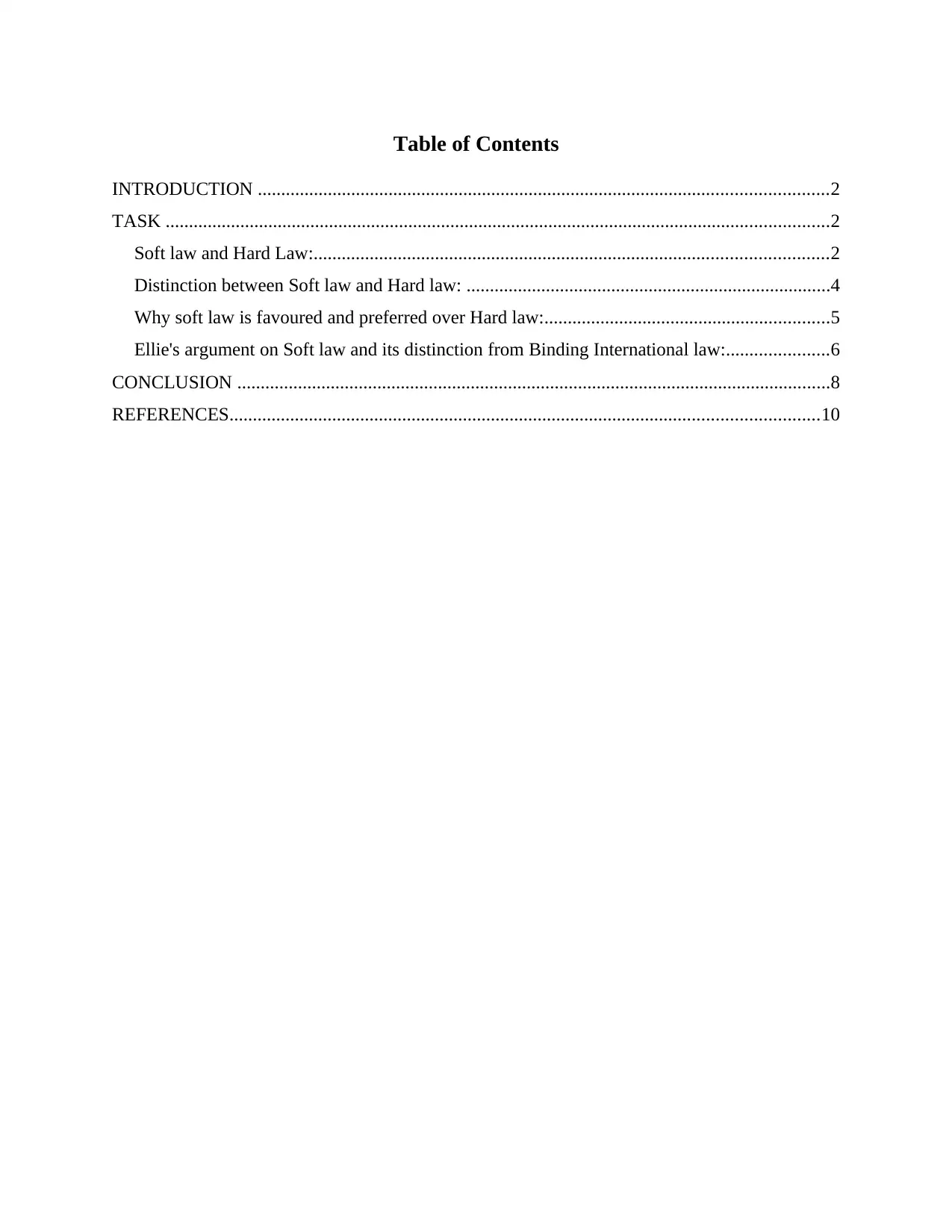
Table of Contents
INTRODUCTION ..........................................................................................................................2
TASK ..............................................................................................................................................2
Soft law and Hard Law:..............................................................................................................2
Distinction between Soft law and Hard law: ..............................................................................4
Why soft law is favoured and preferred over Hard law:.............................................................5
Ellie's argument on Soft law and its distinction from Binding International law:......................6
CONCLUSION ...............................................................................................................................8
REFERENCES..............................................................................................................................10
INTRODUCTION ..........................................................................................................................2
TASK ..............................................................................................................................................2
Soft law and Hard Law:..............................................................................................................2
Distinction between Soft law and Hard law: ..............................................................................4
Why soft law is favoured and preferred over Hard law:.............................................................5
Ellie's argument on Soft law and its distinction from Binding International law:......................6
CONCLUSION ...............................................................................................................................8
REFERENCES..............................................................................................................................10
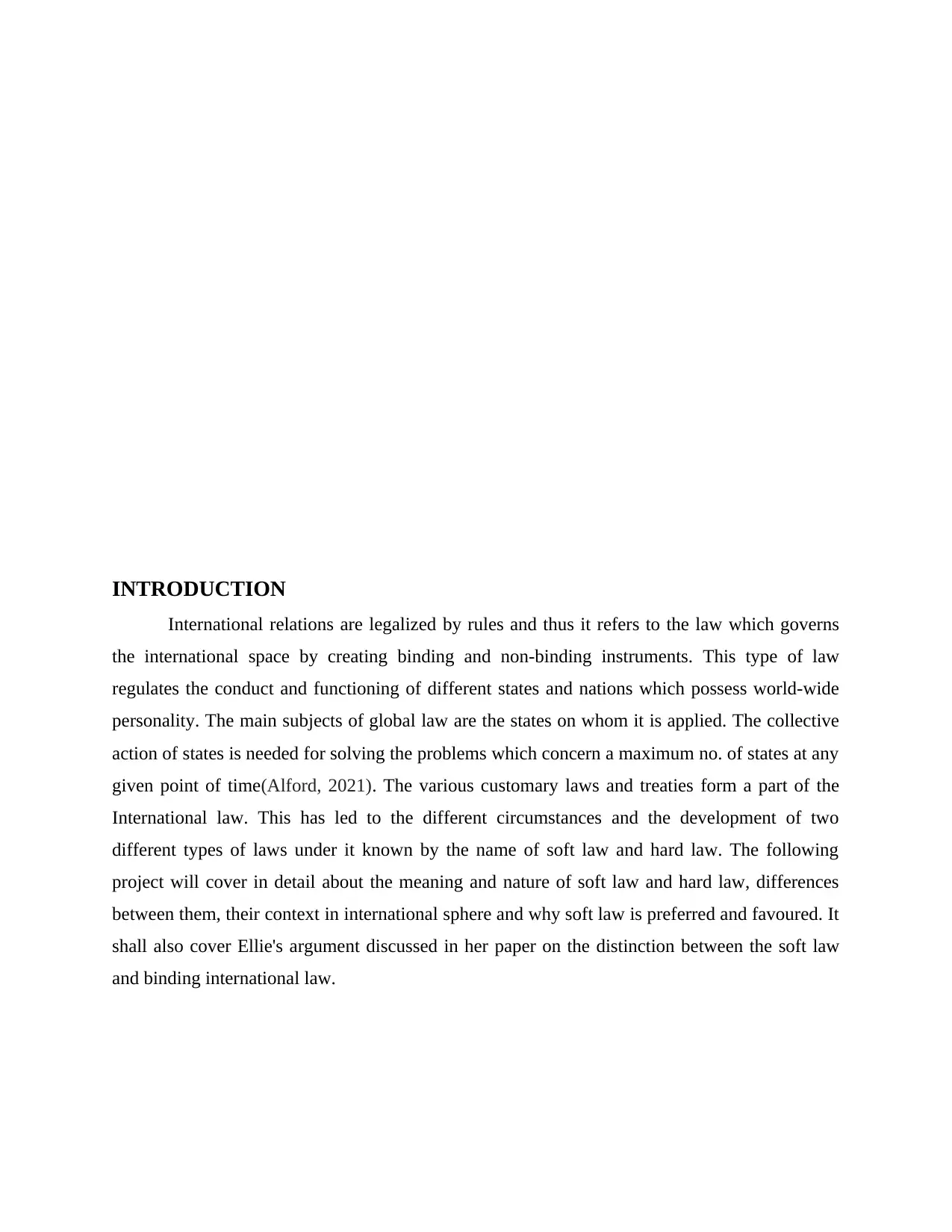
INTRODUCTION
International relations are legalized by rules and thus it refers to the law which governs
the international space by creating binding and non-binding instruments. This type of law
regulates the conduct and functioning of different states and nations which possess world-wide
personality. The main subjects of global law are the states on whom it is applied. The collective
action of states is needed for solving the problems which concern a maximum no. of states at any
given point of time(Alford, 2021). The various customary laws and treaties form a part of the
International law. This has led to the different circumstances and the development of two
different types of laws under it known by the name of soft law and hard law. The following
project will cover in detail about the meaning and nature of soft law and hard law, differences
between them, their context in international sphere and why soft law is preferred and favoured. It
shall also cover Ellie's argument discussed in her paper on the distinction between the soft law
and binding international law.
International relations are legalized by rules and thus it refers to the law which governs
the international space by creating binding and non-binding instruments. This type of law
regulates the conduct and functioning of different states and nations which possess world-wide
personality. The main subjects of global law are the states on whom it is applied. The collective
action of states is needed for solving the problems which concern a maximum no. of states at any
given point of time(Alford, 2021). The various customary laws and treaties form a part of the
International law. This has led to the different circumstances and the development of two
different types of laws under it known by the name of soft law and hard law. The following
project will cover in detail about the meaning and nature of soft law and hard law, differences
between them, their context in international sphere and why soft law is preferred and favoured. It
shall also cover Ellie's argument discussed in her paper on the distinction between the soft law
and binding international law.
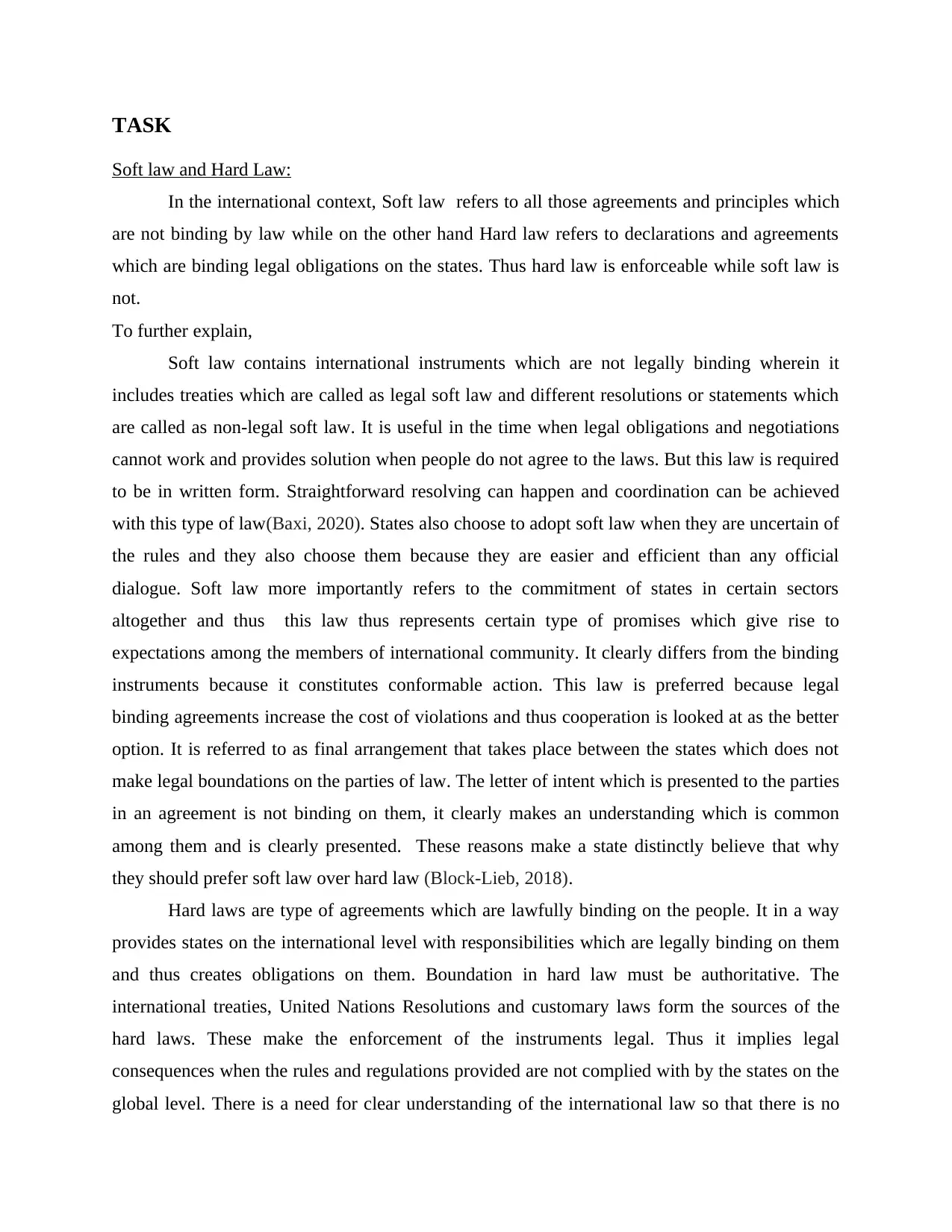
TASK
Soft law and Hard Law:
In the international context, Soft law refers to all those agreements and principles which
are not binding by law while on the other hand Hard law refers to declarations and agreements
which are binding legal obligations on the states. Thus hard law is enforceable while soft law is
not.
To further explain,
Soft law contains international instruments which are not legally binding wherein it
includes treaties which are called as legal soft law and different resolutions or statements which
are called as non-legal soft law. It is useful in the time when legal obligations and negotiations
cannot work and provides solution when people do not agree to the laws. But this law is required
to be in written form. Straightforward resolving can happen and coordination can be achieved
with this type of law(Baxi, 2020). States also choose to adopt soft law when they are uncertain of
the rules and they also choose them because they are easier and efficient than any official
dialogue. Soft law more importantly refers to the commitment of states in certain sectors
altogether and thus this law thus represents certain type of promises which give rise to
expectations among the members of international community. It clearly differs from the binding
instruments because it constitutes conformable action. This law is preferred because legal
binding agreements increase the cost of violations and thus cooperation is looked at as the better
option. It is referred to as final arrangement that takes place between the states which does not
make legal boundations on the parties of law. The letter of intent which is presented to the parties
in an agreement is not binding on them, it clearly makes an understanding which is common
among them and is clearly presented. These reasons make a state distinctly believe that why
they should prefer soft law over hard law (Block-Lieb, 2018).
Hard laws are type of agreements which are lawfully binding on the people. It in a way
provides states on the international level with responsibilities which are legally binding on them
and thus creates obligations on them. Boundation in hard law must be authoritative. The
international treaties, United Nations Resolutions and customary laws form the sources of the
hard laws. These make the enforcement of the instruments legal. Thus it implies legal
consequences when the rules and regulations provided are not complied with by the states on the
global level. There is a need for clear understanding of the international law so that there is no
Soft law and Hard Law:
In the international context, Soft law refers to all those agreements and principles which
are not binding by law while on the other hand Hard law refers to declarations and agreements
which are binding legal obligations on the states. Thus hard law is enforceable while soft law is
not.
To further explain,
Soft law contains international instruments which are not legally binding wherein it
includes treaties which are called as legal soft law and different resolutions or statements which
are called as non-legal soft law. It is useful in the time when legal obligations and negotiations
cannot work and provides solution when people do not agree to the laws. But this law is required
to be in written form. Straightforward resolving can happen and coordination can be achieved
with this type of law(Baxi, 2020). States also choose to adopt soft law when they are uncertain of
the rules and they also choose them because they are easier and efficient than any official
dialogue. Soft law more importantly refers to the commitment of states in certain sectors
altogether and thus this law thus represents certain type of promises which give rise to
expectations among the members of international community. It clearly differs from the binding
instruments because it constitutes conformable action. This law is preferred because legal
binding agreements increase the cost of violations and thus cooperation is looked at as the better
option. It is referred to as final arrangement that takes place between the states which does not
make legal boundations on the parties of law. The letter of intent which is presented to the parties
in an agreement is not binding on them, it clearly makes an understanding which is common
among them and is clearly presented. These reasons make a state distinctly believe that why
they should prefer soft law over hard law (Block-Lieb, 2018).
Hard laws are type of agreements which are lawfully binding on the people. It in a way
provides states on the international level with responsibilities which are legally binding on them
and thus creates obligations on them. Boundation in hard law must be authoritative. The
international treaties, United Nations Resolutions and customary laws form the sources of the
hard laws. These make the enforcement of the instruments legal. Thus it implies legal
consequences when the rules and regulations provided are not complied with by the states on the
global level. There is a need for clear understanding of the international law so that there is no
Secure Best Marks with AI Grader
Need help grading? Try our AI Grader for instant feedback on your assignments.
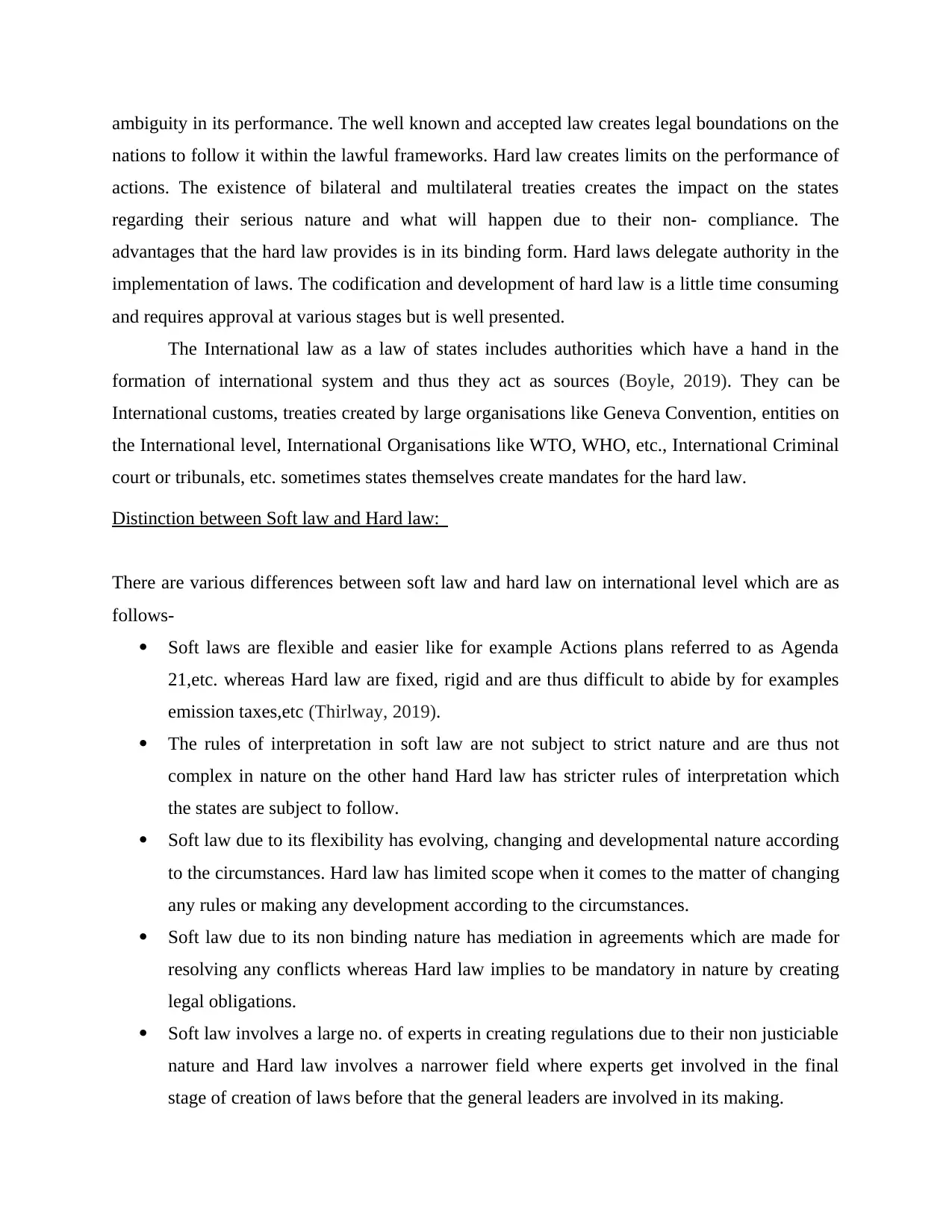
ambiguity in its performance. The well known and accepted law creates legal boundations on the
nations to follow it within the lawful frameworks. Hard law creates limits on the performance of
actions. The existence of bilateral and multilateral treaties creates the impact on the states
regarding their serious nature and what will happen due to their non- compliance. The
advantages that the hard law provides is in its binding form. Hard laws delegate authority in the
implementation of laws. The codification and development of hard law is a little time consuming
and requires approval at various stages but is well presented.
The International law as a law of states includes authorities which have a hand in the
formation of international system and thus they act as sources (Boyle, 2019). They can be
International customs, treaties created by large organisations like Geneva Convention, entities on
the International level, International Organisations like WTO, WHO, etc., International Criminal
court or tribunals, etc. sometimes states themselves create mandates for the hard law.
Distinction between Soft law and Hard law:
There are various differences between soft law and hard law on international level which are as
follows-
Soft laws are flexible and easier like for example Actions plans referred to as Agenda
21,etc. whereas Hard law are fixed, rigid and are thus difficult to abide by for examples
emission taxes,etc (Thirlway, 2019).
The rules of interpretation in soft law are not subject to strict nature and are thus not
complex in nature on the other hand Hard law has stricter rules of interpretation which
the states are subject to follow.
Soft law due to its flexibility has evolving, changing and developmental nature according
to the circumstances. Hard law has limited scope when it comes to the matter of changing
any rules or making any development according to the circumstances.
Soft law due to its non binding nature has mediation in agreements which are made for
resolving any conflicts whereas Hard law implies to be mandatory in nature by creating
legal obligations.
Soft law involves a large no. of experts in creating regulations due to their non justiciable
nature and Hard law involves a narrower field where experts get involved in the final
stage of creation of laws before that the general leaders are involved in its making.
nations to follow it within the lawful frameworks. Hard law creates limits on the performance of
actions. The existence of bilateral and multilateral treaties creates the impact on the states
regarding their serious nature and what will happen due to their non- compliance. The
advantages that the hard law provides is in its binding form. Hard laws delegate authority in the
implementation of laws. The codification and development of hard law is a little time consuming
and requires approval at various stages but is well presented.
The International law as a law of states includes authorities which have a hand in the
formation of international system and thus they act as sources (Boyle, 2019). They can be
International customs, treaties created by large organisations like Geneva Convention, entities on
the International level, International Organisations like WTO, WHO, etc., International Criminal
court or tribunals, etc. sometimes states themselves create mandates for the hard law.
Distinction between Soft law and Hard law:
There are various differences between soft law and hard law on international level which are as
follows-
Soft laws are flexible and easier like for example Actions plans referred to as Agenda
21,etc. whereas Hard law are fixed, rigid and are thus difficult to abide by for examples
emission taxes,etc (Thirlway, 2019).
The rules of interpretation in soft law are not subject to strict nature and are thus not
complex in nature on the other hand Hard law has stricter rules of interpretation which
the states are subject to follow.
Soft law due to its flexibility has evolving, changing and developmental nature according
to the circumstances. Hard law has limited scope when it comes to the matter of changing
any rules or making any development according to the circumstances.
Soft law due to its non binding nature has mediation in agreements which are made for
resolving any conflicts whereas Hard law implies to be mandatory in nature by creating
legal obligations.
Soft law involves a large no. of experts in creating regulations due to their non justiciable
nature and Hard law involves a narrower field where experts get involved in the final
stage of creation of laws before that the general leaders are involved in its making.
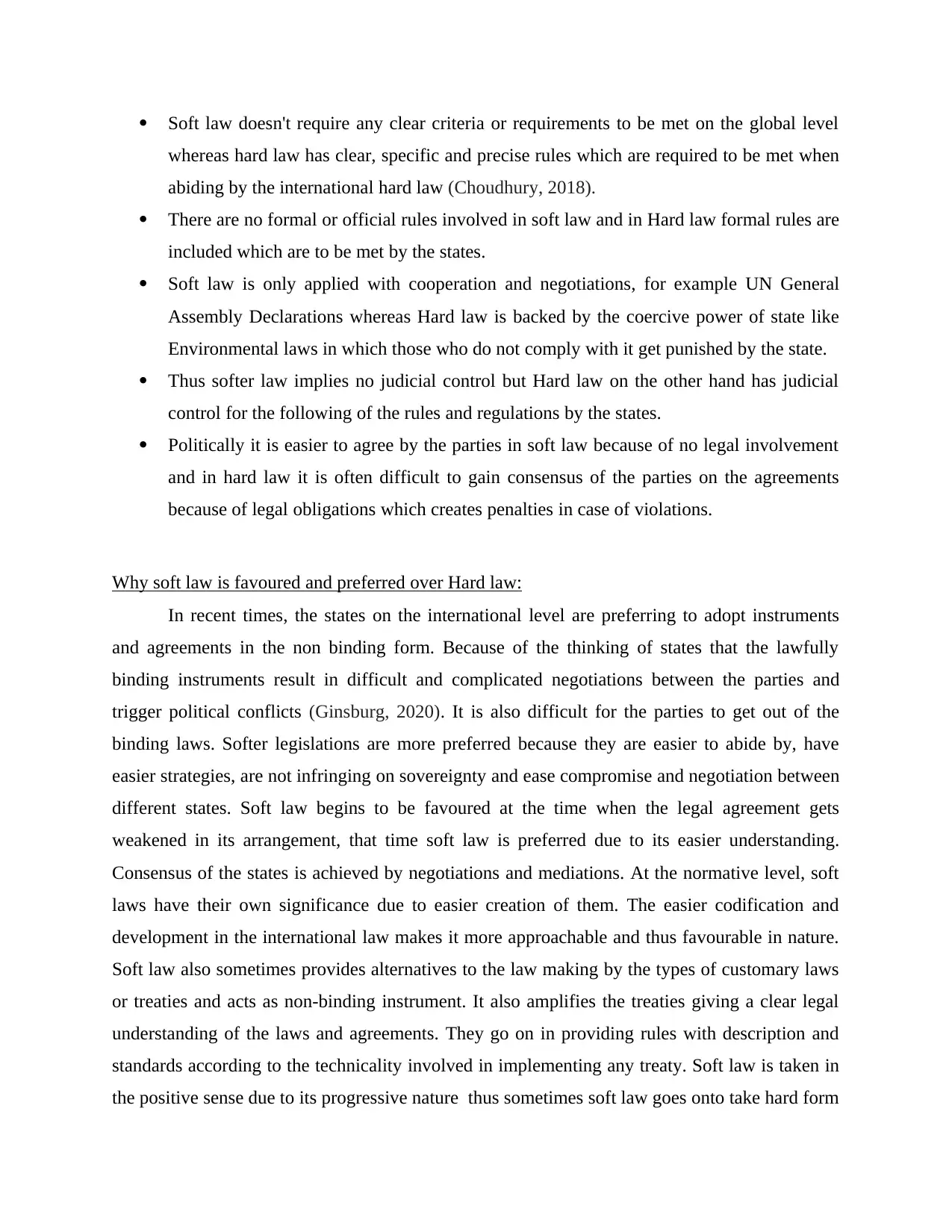
Soft law doesn't require any clear criteria or requirements to be met on the global level
whereas hard law has clear, specific and precise rules which are required to be met when
abiding by the international hard law (Choudhury, 2018).
There are no formal or official rules involved in soft law and in Hard law formal rules are
included which are to be met by the states.
Soft law is only applied with cooperation and negotiations, for example UN General
Assembly Declarations whereas Hard law is backed by the coercive power of state like
Environmental laws in which those who do not comply with it get punished by the state.
Thus softer law implies no judicial control but Hard law on the other hand has judicial
control for the following of the rules and regulations by the states.
Politically it is easier to agree by the parties in soft law because of no legal involvement
and in hard law it is often difficult to gain consensus of the parties on the agreements
because of legal obligations which creates penalties in case of violations.
Why soft law is favoured and preferred over Hard law:
In recent times, the states on the international level are preferring to adopt instruments
and agreements in the non binding form. Because of the thinking of states that the lawfully
binding instruments result in difficult and complicated negotiations between the parties and
trigger political conflicts (Ginsburg, 2020). It is also difficult for the parties to get out of the
binding laws. Softer legislations are more preferred because they are easier to abide by, have
easier strategies, are not infringing on sovereignty and ease compromise and negotiation between
different states. Soft law begins to be favoured at the time when the legal agreement gets
weakened in its arrangement, that time soft law is preferred due to its easier understanding.
Consensus of the states is achieved by negotiations and mediations. At the normative level, soft
laws have their own significance due to easier creation of them. The easier codification and
development in the international law makes it more approachable and thus favourable in nature.
Soft law also sometimes provides alternatives to the law making by the types of customary laws
or treaties and acts as non-binding instrument. It also amplifies the treaties giving a clear legal
understanding of the laws and agreements. They go on in providing rules with description and
standards according to the technicality involved in implementing any treaty. Soft law is taken in
the positive sense due to its progressive nature thus sometimes soft law goes onto take hard form
whereas hard law has clear, specific and precise rules which are required to be met when
abiding by the international hard law (Choudhury, 2018).
There are no formal or official rules involved in soft law and in Hard law formal rules are
included which are to be met by the states.
Soft law is only applied with cooperation and negotiations, for example UN General
Assembly Declarations whereas Hard law is backed by the coercive power of state like
Environmental laws in which those who do not comply with it get punished by the state.
Thus softer law implies no judicial control but Hard law on the other hand has judicial
control for the following of the rules and regulations by the states.
Politically it is easier to agree by the parties in soft law because of no legal involvement
and in hard law it is often difficult to gain consensus of the parties on the agreements
because of legal obligations which creates penalties in case of violations.
Why soft law is favoured and preferred over Hard law:
In recent times, the states on the international level are preferring to adopt instruments
and agreements in the non binding form. Because of the thinking of states that the lawfully
binding instruments result in difficult and complicated negotiations between the parties and
trigger political conflicts (Ginsburg, 2020). It is also difficult for the parties to get out of the
binding laws. Softer legislations are more preferred because they are easier to abide by, have
easier strategies, are not infringing on sovereignty and ease compromise and negotiation between
different states. Soft law begins to be favoured at the time when the legal agreement gets
weakened in its arrangement, that time soft law is preferred due to its easier understanding.
Consensus of the states is achieved by negotiations and mediations. At the normative level, soft
laws have their own significance due to easier creation of them. The easier codification and
development in the international law makes it more approachable and thus favourable in nature.
Soft law also sometimes provides alternatives to the law making by the types of customary laws
or treaties and acts as non-binding instrument. It also amplifies the treaties giving a clear legal
understanding of the laws and agreements. They go on in providing rules with description and
standards according to the technicality involved in implementing any treaty. Soft law is taken in
the positive sense due to its progressive nature thus sometimes soft law goes onto take hard form
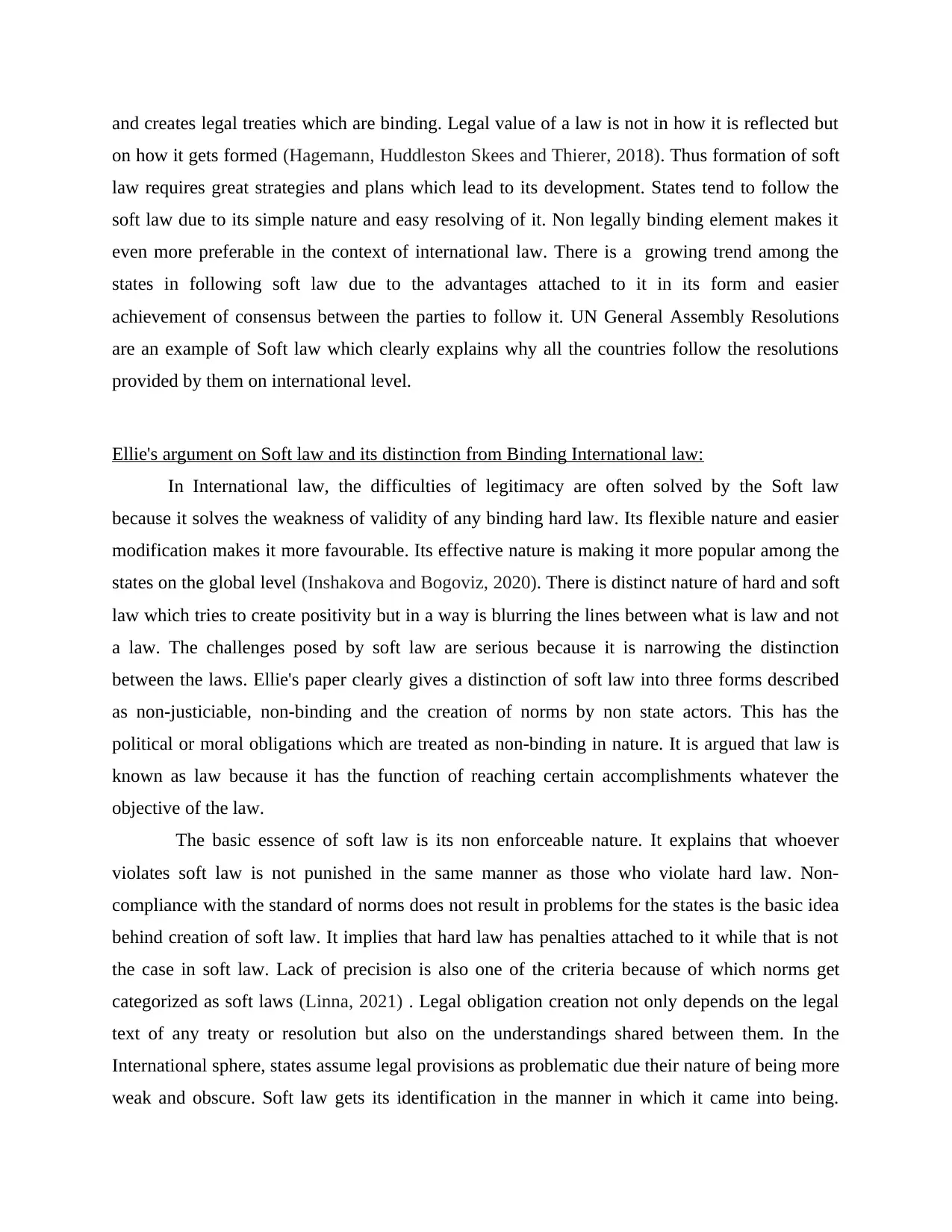
and creates legal treaties which are binding. Legal value of a law is not in how it is reflected but
on how it gets formed (Hagemann, Huddleston Skees and Thierer, 2018). Thus formation of soft
law requires great strategies and plans which lead to its development. States tend to follow the
soft law due to its simple nature and easy resolving of it. Non legally binding element makes it
even more preferable in the context of international law. There is a growing trend among the
states in following soft law due to the advantages attached to it in its form and easier
achievement of consensus between the parties to follow it. UN General Assembly Resolutions
are an example of Soft law which clearly explains why all the countries follow the resolutions
provided by them on international level.
Ellie's argument on Soft law and its distinction from Binding International law:
In International law, the difficulties of legitimacy are often solved by the Soft law
because it solves the weakness of validity of any binding hard law. Its flexible nature and easier
modification makes it more favourable. Its effective nature is making it more popular among the
states on the global level (Inshakova and Bogoviz, 2020). There is distinct nature of hard and soft
law which tries to create positivity but in a way is blurring the lines between what is law and not
a law. The challenges posed by soft law are serious because it is narrowing the distinction
between the laws. Ellie's paper clearly gives a distinction of soft law into three forms described
as non-justiciable, non-binding and the creation of norms by non state actors. This has the
political or moral obligations which are treated as non-binding in nature. It is argued that law is
known as law because it has the function of reaching certain accomplishments whatever the
objective of the law.
The basic essence of soft law is its non enforceable nature. It explains that whoever
violates soft law is not punished in the same manner as those who violate hard law. Non-
compliance with the standard of norms does not result in problems for the states is the basic idea
behind creation of soft law. It implies that hard law has penalties attached to it while that is not
the case in soft law. Lack of precision is also one of the criteria because of which norms get
categorized as soft laws (Linna, 2021) . Legal obligation creation not only depends on the legal
text of any treaty or resolution but also on the understandings shared between them. In the
International sphere, states assume legal provisions as problematic due their nature of being more
weak and obscure. Soft law gets its identification in the manner in which it came into being.
on how it gets formed (Hagemann, Huddleston Skees and Thierer, 2018). Thus formation of soft
law requires great strategies and plans which lead to its development. States tend to follow the
soft law due to its simple nature and easy resolving of it. Non legally binding element makes it
even more preferable in the context of international law. There is a growing trend among the
states in following soft law due to the advantages attached to it in its form and easier
achievement of consensus between the parties to follow it. UN General Assembly Resolutions
are an example of Soft law which clearly explains why all the countries follow the resolutions
provided by them on international level.
Ellie's argument on Soft law and its distinction from Binding International law:
In International law, the difficulties of legitimacy are often solved by the Soft law
because it solves the weakness of validity of any binding hard law. Its flexible nature and easier
modification makes it more favourable. Its effective nature is making it more popular among the
states on the global level (Inshakova and Bogoviz, 2020). There is distinct nature of hard and soft
law which tries to create positivity but in a way is blurring the lines between what is law and not
a law. The challenges posed by soft law are serious because it is narrowing the distinction
between the laws. Ellie's paper clearly gives a distinction of soft law into three forms described
as non-justiciable, non-binding and the creation of norms by non state actors. This has the
political or moral obligations which are treated as non-binding in nature. It is argued that law is
known as law because it has the function of reaching certain accomplishments whatever the
objective of the law.
The basic essence of soft law is its non enforceable nature. It explains that whoever
violates soft law is not punished in the same manner as those who violate hard law. Non-
compliance with the standard of norms does not result in problems for the states is the basic idea
behind creation of soft law. It implies that hard law has penalties attached to it while that is not
the case in soft law. Lack of precision is also one of the criteria because of which norms get
categorized as soft laws (Linna, 2021) . Legal obligation creation not only depends on the legal
text of any treaty or resolution but also on the understandings shared between them. In the
International sphere, states assume legal provisions as problematic due their nature of being more
weak and obscure. Soft law gets its identification in the manner in which it came into being.
Paraphrase This Document
Need a fresh take? Get an instant paraphrase of this document with our AI Paraphraser
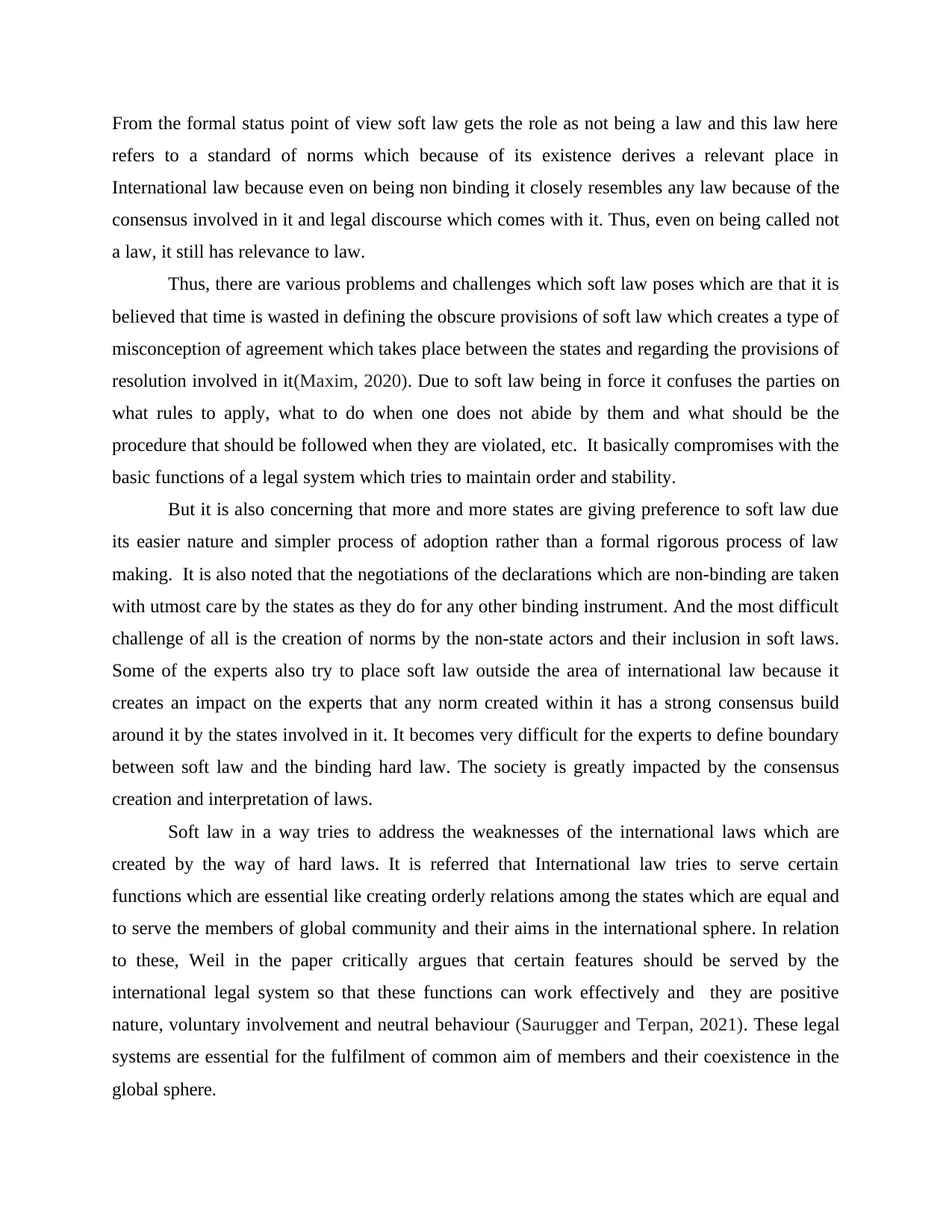
From the formal status point of view soft law gets the role as not being a law and this law here
refers to a standard of norms which because of its existence derives a relevant place in
International law because even on being non binding it closely resembles any law because of the
consensus involved in it and legal discourse which comes with it. Thus, even on being called not
a law, it still has relevance to law.
Thus, there are various problems and challenges which soft law poses which are that it is
believed that time is wasted in defining the obscure provisions of soft law which creates a type of
misconception of agreement which takes place between the states and regarding the provisions of
resolution involved in it(Maxim, 2020). Due to soft law being in force it confuses the parties on
what rules to apply, what to do when one does not abide by them and what should be the
procedure that should be followed when they are violated, etc. It basically compromises with the
basic functions of a legal system which tries to maintain order and stability.
But it is also concerning that more and more states are giving preference to soft law due
its easier nature and simpler process of adoption rather than a formal rigorous process of law
making. It is also noted that the negotiations of the declarations which are non-binding are taken
with utmost care by the states as they do for any other binding instrument. And the most difficult
challenge of all is the creation of norms by the non-state actors and their inclusion in soft laws.
Some of the experts also try to place soft law outside the area of international law because it
creates an impact on the experts that any norm created within it has a strong consensus build
around it by the states involved in it. It becomes very difficult for the experts to define boundary
between soft law and the binding hard law. The society is greatly impacted by the consensus
creation and interpretation of laws.
Soft law in a way tries to address the weaknesses of the international laws which are
created by the way of hard laws. It is referred that International law tries to serve certain
functions which are essential like creating orderly relations among the states which are equal and
to serve the members of global community and their aims in the international sphere. In relation
to these, Weil in the paper critically argues that certain features should be served by the
international legal system so that these functions can work effectively and they are positive
nature, voluntary involvement and neutral behaviour (Saurugger and Terpan, 2021). These legal
systems are essential for the fulfilment of common aim of members and their coexistence in the
global sphere.
refers to a standard of norms which because of its existence derives a relevant place in
International law because even on being non binding it closely resembles any law because of the
consensus involved in it and legal discourse which comes with it. Thus, even on being called not
a law, it still has relevance to law.
Thus, there are various problems and challenges which soft law poses which are that it is
believed that time is wasted in defining the obscure provisions of soft law which creates a type of
misconception of agreement which takes place between the states and regarding the provisions of
resolution involved in it(Maxim, 2020). Due to soft law being in force it confuses the parties on
what rules to apply, what to do when one does not abide by them and what should be the
procedure that should be followed when they are violated, etc. It basically compromises with the
basic functions of a legal system which tries to maintain order and stability.
But it is also concerning that more and more states are giving preference to soft law due
its easier nature and simpler process of adoption rather than a formal rigorous process of law
making. It is also noted that the negotiations of the declarations which are non-binding are taken
with utmost care by the states as they do for any other binding instrument. And the most difficult
challenge of all is the creation of norms by the non-state actors and their inclusion in soft laws.
Some of the experts also try to place soft law outside the area of international law because it
creates an impact on the experts that any norm created within it has a strong consensus build
around it by the states involved in it. It becomes very difficult for the experts to define boundary
between soft law and the binding hard law. The society is greatly impacted by the consensus
creation and interpretation of laws.
Soft law in a way tries to address the weaknesses of the international laws which are
created by the way of hard laws. It is referred that International law tries to serve certain
functions which are essential like creating orderly relations among the states which are equal and
to serve the members of global community and their aims in the international sphere. In relation
to these, Weil in the paper critically argues that certain features should be served by the
international legal system so that these functions can work effectively and they are positive
nature, voluntary involvement and neutral behaviour (Saurugger and Terpan, 2021). These legal
systems are essential for the fulfilment of common aim of members and their coexistence in the
global sphere.
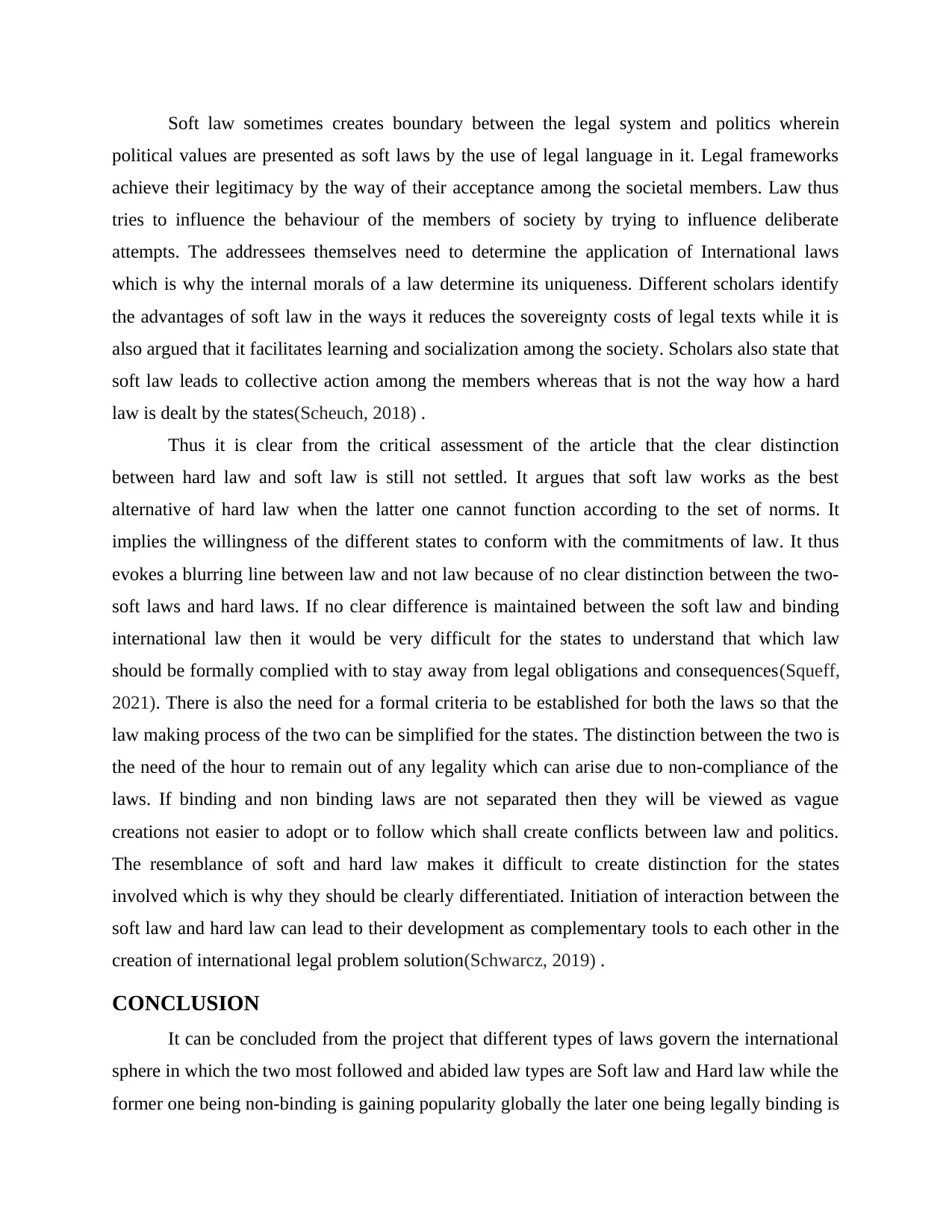
Soft law sometimes creates boundary between the legal system and politics wherein
political values are presented as soft laws by the use of legal language in it. Legal frameworks
achieve their legitimacy by the way of their acceptance among the societal members. Law thus
tries to influence the behaviour of the members of society by trying to influence deliberate
attempts. The addressees themselves need to determine the application of International laws
which is why the internal morals of a law determine its uniqueness. Different scholars identify
the advantages of soft law in the ways it reduces the sovereignty costs of legal texts while it is
also argued that it facilitates learning and socialization among the society. Scholars also state that
soft law leads to collective action among the members whereas that is not the way how a hard
law is dealt by the states(Scheuch, 2018) .
Thus it is clear from the critical assessment of the article that the clear distinction
between hard law and soft law is still not settled. It argues that soft law works as the best
alternative of hard law when the latter one cannot function according to the set of norms. It
implies the willingness of the different states to conform with the commitments of law. It thus
evokes a blurring line between law and not law because of no clear distinction between the two-
soft laws and hard laws. If no clear difference is maintained between the soft law and binding
international law then it would be very difficult for the states to understand that which law
should be formally complied with to stay away from legal obligations and consequences(Squeff,
2021). There is also the need for a formal criteria to be established for both the laws so that the
law making process of the two can be simplified for the states. The distinction between the two is
the need of the hour to remain out of any legality which can arise due to non-compliance of the
laws. If binding and non binding laws are not separated then they will be viewed as vague
creations not easier to adopt or to follow which shall create conflicts between law and politics.
The resemblance of soft and hard law makes it difficult to create distinction for the states
involved which is why they should be clearly differentiated. Initiation of interaction between the
soft law and hard law can lead to their development as complementary tools to each other in the
creation of international legal problem solution(Schwarcz, 2019) .
CONCLUSION
It can be concluded from the project that different types of laws govern the international
sphere in which the two most followed and abided law types are Soft law and Hard law while the
former one being non-binding is gaining popularity globally the later one being legally binding is
political values are presented as soft laws by the use of legal language in it. Legal frameworks
achieve their legitimacy by the way of their acceptance among the societal members. Law thus
tries to influence the behaviour of the members of society by trying to influence deliberate
attempts. The addressees themselves need to determine the application of International laws
which is why the internal morals of a law determine its uniqueness. Different scholars identify
the advantages of soft law in the ways it reduces the sovereignty costs of legal texts while it is
also argued that it facilitates learning and socialization among the society. Scholars also state that
soft law leads to collective action among the members whereas that is not the way how a hard
law is dealt by the states(Scheuch, 2018) .
Thus it is clear from the critical assessment of the article that the clear distinction
between hard law and soft law is still not settled. It argues that soft law works as the best
alternative of hard law when the latter one cannot function according to the set of norms. It
implies the willingness of the different states to conform with the commitments of law. It thus
evokes a blurring line between law and not law because of no clear distinction between the two-
soft laws and hard laws. If no clear difference is maintained between the soft law and binding
international law then it would be very difficult for the states to understand that which law
should be formally complied with to stay away from legal obligations and consequences(Squeff,
2021). There is also the need for a formal criteria to be established for both the laws so that the
law making process of the two can be simplified for the states. The distinction between the two is
the need of the hour to remain out of any legality which can arise due to non-compliance of the
laws. If binding and non binding laws are not separated then they will be viewed as vague
creations not easier to adopt or to follow which shall create conflicts between law and politics.
The resemblance of soft and hard law makes it difficult to create distinction for the states
involved which is why they should be clearly differentiated. Initiation of interaction between the
soft law and hard law can lead to their development as complementary tools to each other in the
creation of international legal problem solution(Schwarcz, 2019) .
CONCLUSION
It can be concluded from the project that different types of laws govern the international
sphere in which the two most followed and abided law types are Soft law and Hard law while the
former one being non-binding is gaining popularity globally the later one being legally binding is

getting less preferred by the states. These laws are increasingly blurring the distinction between
the laws and politics of states. Non-compliance of hard law pushes a person or state towards
penalties and punishments while in the soft law it tries to resolve an issue by mediation or
negotiation. The arguments presented in the paper also clearly establish the need of distinction
between the soft law and binding international law.
the laws and politics of states. Non-compliance of hard law pushes a person or state towards
penalties and punishments while in the soft law it tries to resolve an issue by mediation or
negotiation. The arguments presented in the paper also clearly establish the need of distinction
between the soft law and binding international law.
Secure Best Marks with AI Grader
Need help grading? Try our AI Grader for instant feedback on your assignments.
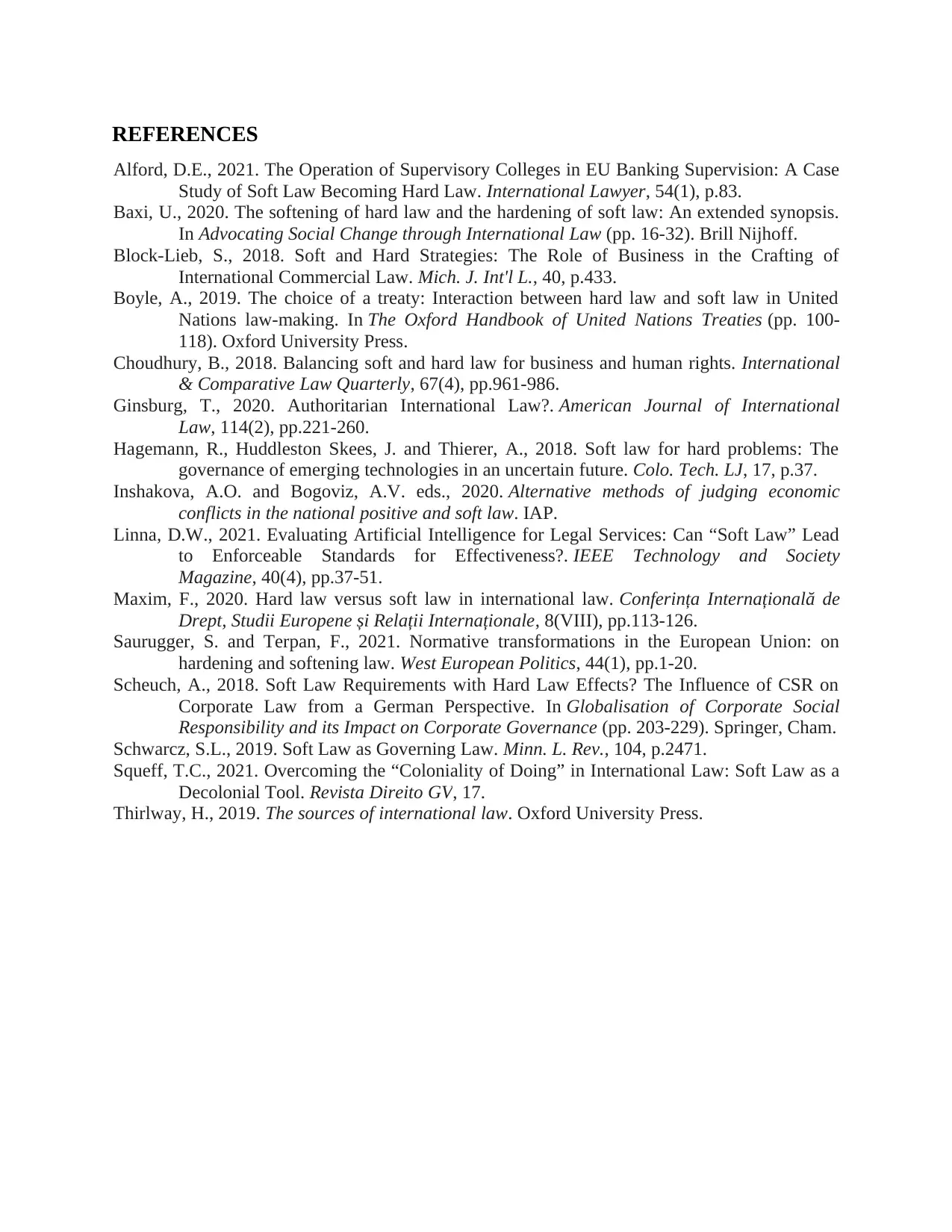
REFERENCES
Alford, D.E., 2021. The Operation of Supervisory Colleges in EU Banking Supervision: A Case
Study of Soft Law Becoming Hard Law. International Lawyer, 54(1), p.83.
Baxi, U., 2020. The softening of hard law and the hardening of soft law: An extended synopsis.
In Advocating Social Change through International Law (pp. 16-32). Brill Nijhoff.
Block-Lieb, S., 2018. Soft and Hard Strategies: The Role of Business in the Crafting of
International Commercial Law. Mich. J. Int'l L., 40, p.433.
Boyle, A., 2019. The choice of a treaty: Interaction between hard law and soft law in United
Nations law-making. In The Oxford Handbook of United Nations Treaties (pp. 100-
118). Oxford University Press.
Choudhury, B., 2018. Balancing soft and hard law for business and human rights. International
& Comparative Law Quarterly, 67(4), pp.961-986.
Ginsburg, T., 2020. Authoritarian International Law?. American Journal of International
Law, 114(2), pp.221-260.
Hagemann, R., Huddleston Skees, J. and Thierer, A., 2018. Soft law for hard problems: The
governance of emerging technologies in an uncertain future. Colo. Tech. LJ, 17, p.37.
Inshakova, A.O. and Bogoviz, A.V. eds., 2020. Alternative methods of judging economic
conflicts in the national positive and soft law. IAP.
Linna, D.W., 2021. Evaluating Artificial Intelligence for Legal Services: Can “Soft Law” Lead
to Enforceable Standards for Effectiveness?. IEEE Technology and Society
Magazine, 40(4), pp.37-51.
Maxim, F., 2020. Hard law versus soft law in international law. Conferința Internațională de
Drept, Studii Europene și Relații Internaționale, 8(VIII), pp.113-126.
Saurugger, S. and Terpan, F., 2021. Normative transformations in the European Union: on
hardening and softening law. West European Politics, 44(1), pp.1-20.
Scheuch, A., 2018. Soft Law Requirements with Hard Law Effects? The Influence of CSR on
Corporate Law from a German Perspective. In Globalisation of Corporate Social
Responsibility and its Impact on Corporate Governance (pp. 203-229). Springer, Cham.
Schwarcz, S.L., 2019. Soft Law as Governing Law. Minn. L. Rev., 104, p.2471.
Squeff, T.C., 2021. Overcoming the “Coloniality of Doing” in International Law: Soft Law as a
Decolonial Tool. Revista Direito GV, 17.
Thirlway, H., 2019. The sources of international law. Oxford University Press.
Alford, D.E., 2021. The Operation of Supervisory Colleges in EU Banking Supervision: A Case
Study of Soft Law Becoming Hard Law. International Lawyer, 54(1), p.83.
Baxi, U., 2020. The softening of hard law and the hardening of soft law: An extended synopsis.
In Advocating Social Change through International Law (pp. 16-32). Brill Nijhoff.
Block-Lieb, S., 2018. Soft and Hard Strategies: The Role of Business in the Crafting of
International Commercial Law. Mich. J. Int'l L., 40, p.433.
Boyle, A., 2019. The choice of a treaty: Interaction between hard law and soft law in United
Nations law-making. In The Oxford Handbook of United Nations Treaties (pp. 100-
118). Oxford University Press.
Choudhury, B., 2018. Balancing soft and hard law for business and human rights. International
& Comparative Law Quarterly, 67(4), pp.961-986.
Ginsburg, T., 2020. Authoritarian International Law?. American Journal of International
Law, 114(2), pp.221-260.
Hagemann, R., Huddleston Skees, J. and Thierer, A., 2018. Soft law for hard problems: The
governance of emerging technologies in an uncertain future. Colo. Tech. LJ, 17, p.37.
Inshakova, A.O. and Bogoviz, A.V. eds., 2020. Alternative methods of judging economic
conflicts in the national positive and soft law. IAP.
Linna, D.W., 2021. Evaluating Artificial Intelligence for Legal Services: Can “Soft Law” Lead
to Enforceable Standards for Effectiveness?. IEEE Technology and Society
Magazine, 40(4), pp.37-51.
Maxim, F., 2020. Hard law versus soft law in international law. Conferința Internațională de
Drept, Studii Europene și Relații Internaționale, 8(VIII), pp.113-126.
Saurugger, S. and Terpan, F., 2021. Normative transformations in the European Union: on
hardening and softening law. West European Politics, 44(1), pp.1-20.
Scheuch, A., 2018. Soft Law Requirements with Hard Law Effects? The Influence of CSR on
Corporate Law from a German Perspective. In Globalisation of Corporate Social
Responsibility and its Impact on Corporate Governance (pp. 203-229). Springer, Cham.
Schwarcz, S.L., 2019. Soft Law as Governing Law. Minn. L. Rev., 104, p.2471.
Squeff, T.C., 2021. Overcoming the “Coloniality of Doing” in International Law: Soft Law as a
Decolonial Tool. Revista Direito GV, 17.
Thirlway, H., 2019. The sources of international law. Oxford University Press.
1 out of 11
Related Documents
Your All-in-One AI-Powered Toolkit for Academic Success.
+13062052269
info@desklib.com
Available 24*7 on WhatsApp / Email
![[object Object]](/_next/static/media/star-bottom.7253800d.svg)
Unlock your academic potential
© 2024 | Zucol Services PVT LTD | All rights reserved.





